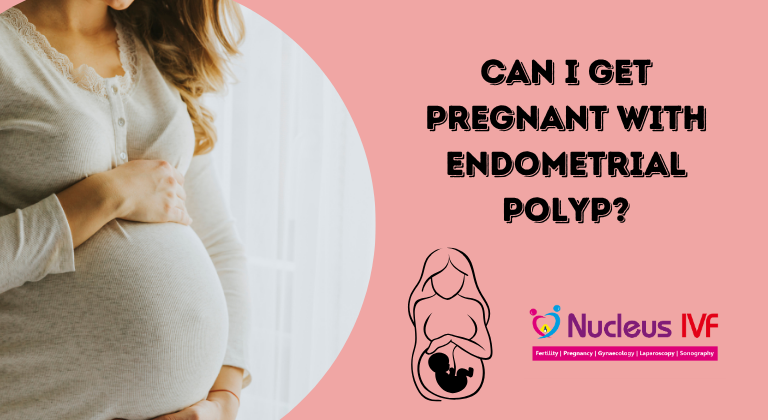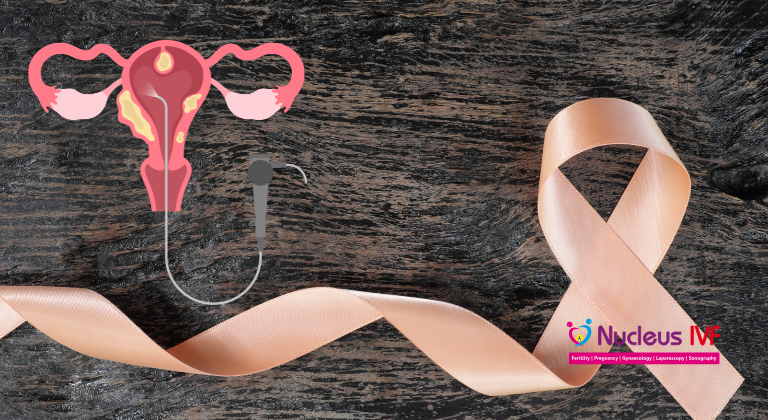Many women trying to conceive may be unaware that small, often harmless growths in the uterus called endometrial polyps could interfere with their fertility. While not always a serious health issue, these polyps can play a significant role in fertility complications, especially if left undiagnosed.

At Nucleus IVF Wakad Pune, under the expert guidance of Dr. Pritam Sulakhe, we help couples understand how uterine conditions like endometrial polyps can impact pregnancy outcomes and what treatments can improve success rates.
What Are Endometrial Polyps?
Endometrial polyps are soft, finger-like overgrowths of the tissue lining the uterus (endometrium). They vary in size and can be single or multiple.
These polyps are usually non-cancerous but may cause problems like:
Irregular or heavy periods
Spotting between cycles
Difficulty conceiving
They are most common in women aged 30 to 50 and those experiencing hormonal imbalances.
How Do Endometrial Polyps Affect Fertility?
Endometrial polyps can directly interfere with pregnancy in the following ways:
1. Blocked Implantation
A polyp located in the uterine cavity may prevent the fertilized egg from attaching to the wall of the uterus.
2. Hormonal Disruption
Polyps may cause estrogen dominance in the uterus, altering the ideal environment needed for embryo development.
3. Increased Risk of Miscarriage
Some studies suggest that polyps, especially larger or multiple ones, can lead to early pregnancy loss.
“Even small polyps can significantly affect fertility — particularly when they alter the shape or function of the uterine cavity.”
Diagnosis of Endometrial Polyps
At Nucleus IVF Pune, we use the latest technology to accurately detect and evaluate uterine polyps. Common diagnostic tools include:
Transvaginal Ultrasound: First-line imaging for abnormalities
Saline Infusion Sonography (SIS): Offers clearer view of intrauterine structures
Hysteroscopy: Gold standard test allowing direct visualization and immediate removal if necessary

Can You Still Get Pregnant Naturally?
Yes, many women with small or asymptomatic polyps conceive naturally. However, if you’ve been trying to get pregnant without success for more than 6–12 months, a thorough uterine evaluation is recommended.
If polyps are found to be affecting your chances, timely removal usually improves conception rates — either naturally or through assisted methods like IUI or IVF.
Treatment Options: Polyp Removal (Polypectomy)
What Is Polypectomy?
A simple outpatient procedure done via hysteroscopy. It involves:
No major cuts
Minimal discomfort
Short recovery time
Immediate improvement in uterine conditions for pregnancy
At Nucleus IVF Wakad, we perform polypectomy with advanced hysteroscopic tools to ensure safety and precision.
When to See a Fertility Doctor?
You should consult a specialist if you:
Have had multiple failed IVF or IUI attempts
Experience irregular or heavy periods
Suffer from unexplained infertility
Are over 35 and haven’t conceived within 6 months
Early detection and treatment of uterine polyps can significantly improve fertility outcomes.
Why Choose Nucleus IVF Pune?
Experienced laparoscopic & hysteroscopic care by Dr. Pritam Sulakhe
Focused fertility planning and counseling
High-quality diagnostics and treatment under one roof
Located in Wakad, easily accessible from Hinjewadi, Baner, Aundh, Pimple Saudagar
Final Thoughts
Endometrial polyps are often overlooked but can silently interfere with your ability to conceive. The good news is that with proper diagnosis and minimally invasive treatment, your chances of pregnancy can improve dramatically.
At Nucleus IVF Pune, we prioritize patient-first care and fertility outcomes. If you suspect something is affecting your chances, we encourage you to take the next step.
📞 Book your consultation with Dr. Pritam Sulakhe at Nucleus IVF Wakad today. Let’s uncover the root cause and bring you closer to parenthood.
Dr. Pritam Prakash Sulakhe
Dr. Pritam Prakash Sulakhe
author
Dr. Pritam Prakash Sulakhe has completed his MBBS from B J Government Medical College , Pune which is one of the top medical College in India. He continued his post-graduation as DGO at same institute. After that he opted for Diplomat Of national Board In Obstetrics and Gynecology from Kerala Institute Of Medical Sciences Trivandrum, which is one of the most prestigious institute from South India.


